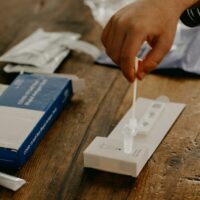As the state heads into Kentucky Derby weekend, Gov. Andy Beshear said all the metrics to measure COVID-19 give Kentuckians little to be concerned about.
“You’re pretty safe from where the virus is right now, if you’re fully vaccinated and boosted,” Beshear said at his weekly press conference. “If you are unvaccinated, this virus could still be very difficult on your health.”
Crowds pose more risk, even to the vaccinated. Beshear said he and his family will carry masks with them to the Derby and use them as needed, and that was his advice for others: use a mask if they feel uncomfortable.
“My kids, my wife, just like everybody else, know all about how this thing spreads now,” he said. “They are all fully vaccinated.”
The state’s coronavirus report for last week showed cases had plateaued, but the state was seeing a steady increase in the share of Kentuckians testing positive for the virus. COVID-19 hospitalizations and intensive-care cases, while up a bit, were still lower than last summer before the Omicron virus variant hit.
Beshear said he was not concerned about another surge of cases later this summer as new variants keep surfacing and with the state’s positivity rate on the rise. He said there would be cause for concern if the severity of the disease was causing increased hospitalizations, which it is not.
“So, I don’t have cause for concern at this time,” he said.
Beshear also noted that while COVID-19 vaccination rates have slowed down in Kentucky, people are still getting them.
“While our vaccination numbers are smaller than they have been at most times during the pandemic, everyday people still choose to get vaccinated for the first time,” he said.
He noted that the the 65- to 74-year-olds vaccine rate went up one percent, from 97% to 98%.
“This provides a great amount of protection for them and we are proud of them,” he said.
The Washington Post reports that Kentucky gave an average of 3,244 Covid-19 vaccines per day in the last week, a 12% decrease over the week before.
The U.S. Food and Drug Administration announced May 5 that it is limiting the emergency use authorization of the one-dose Johnson & Jonson/JanssenCovid-19 vaccine to people who cannot or will not get the Pfizer-BioNTech or Moderna versions of the vaccine, citing the risk of rare blood clots.
The FDA said it was making the decision “after conducting an updated analysis, evaluation and investigation of reported cases” of the “rare and potentially life-threatening blood clots” which “warrants limiting the authorized use of the vaccine.”
As of March 18, the news release reports that there have been 60 confirmed cases of these rare blood clots, called thrombosis with thrombocytopenia syndrome or TTS, including nine fatalities. That is about three cases of blood clots for every million J&J vaccines administered, and 0.48 deaths per million doses of the J&J vaccine.
“We’ve been closely monitoring the Janssen COVID-19 Vaccine and occurrence of TTS following its administration and have used updated information from our safety surveillance systems to revise the EUA,” said Peter Marks, a top FDA official.
The Kentucky Department for Public Health shows that 54% of the COVID-19 first doses that have been administered in Kentucky are Pfizer, 38% are Moderna and 7% are J&J.
Medical cannabis
Beshear announced in mid-April that he had asked his legal team to explore whether it would be possible to address the issue of medical marijuana by executive action.
Asked for an update, Beshear said that the legal analysis is not final, “but I do think that there is going to be room for at least some executive order.”
Beshear also said in April that he was creating the Governor’s Medical Cannabis Advisory Team to travel the state to hear from Kentuckians about the issue. He said thousands of people have said they want to be a part of it and that the hope is that it will be up and running “pretty soon.”






